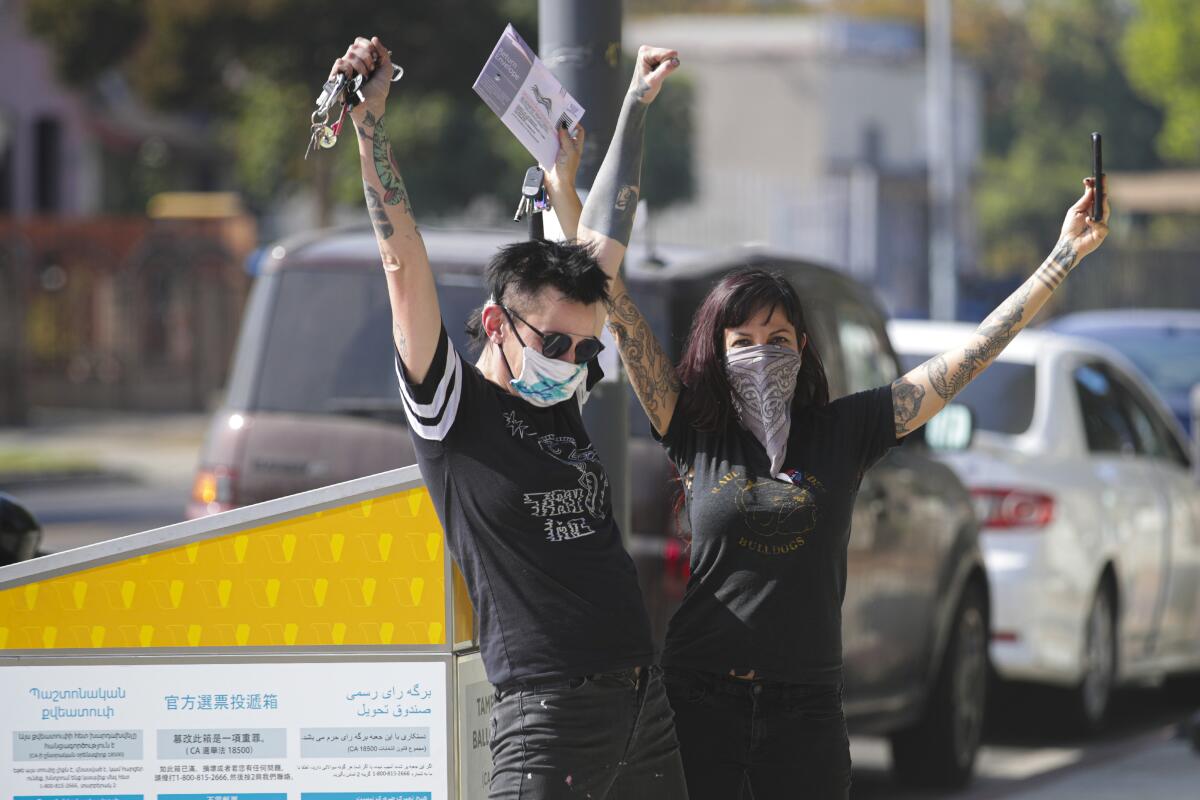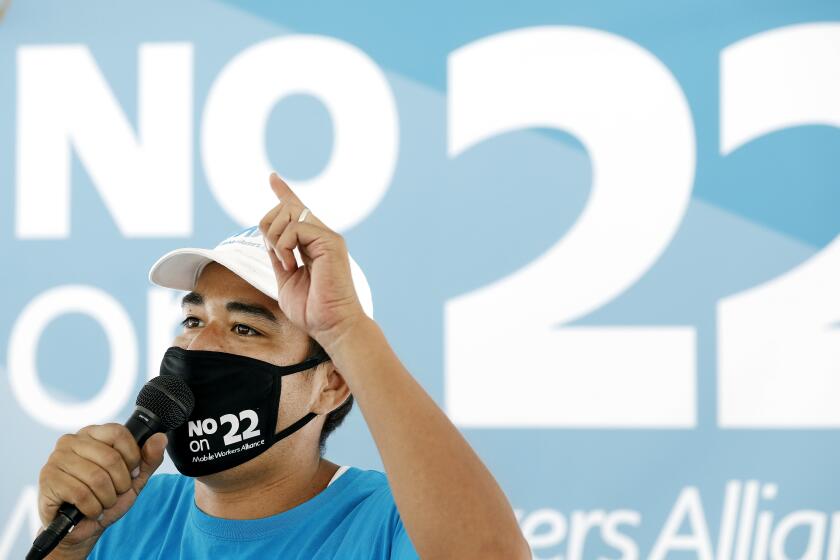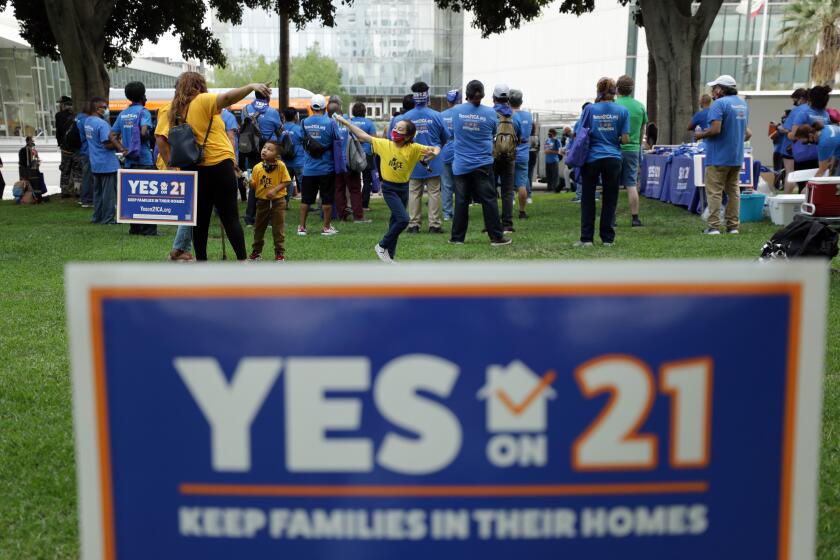California campaign finance complaints rose sharply in 2020

- Share via
SACRAMENTO — California’s political watchdog agency saw a big jump in the number of complaints alleging campaign law violations for the November election, even in comparison to the tumultuous 2016 presidential election year, and dozens of investigations are ongoing, officials say.
The state Fair Political Practices Commission received 445 complaints of campaign finance violations and other offenses from Oct. 1 through election day, compared with 307 in the five weeks leading up to the Nov. 8, 2016, election. The agency said it has so far opened investigations into 112 of the complaints filed in recent weeks.
Though the surge in allegations of campaign irregularities may partly be the result of a large slate of statewide ballot initiatives that generated political heat, political scientist Larry Gerston said he thinks a bigger factor is the tension sparked by the presidential contest.
“I haven’t seen this much collective angst since 1968,” said Gerston, professor emeritus at San Jose State. “The political environment is singed with distrust and anger.”
The complaints received by the FPPC allege violations of California campaign laws regarding state and local elections, including whether campaigns properly reported contributions and how they were spent, as well as whether political ads included required disclosures, such as who paid for them.
The FPPC does not have jurisdiction to look at allegations of offenses involving federal races, including the contest for president.
Still, the turmoil over the contest between President Trump and Democratic challenger Joe Biden has raised the political temperature for other contests as well, experts say.
The state campaign watchdog agency has tried to make people aware of the complaint process and has taken the lead in some situations in which a citizen hasn’t filed a formal complaint, said Richard C. Miadich, chairman of the FPPC. Of the 445 complaints filed in the last month, five were initiated by commission staff based on information such as media reports of allegations.
“It’s the nature of things to see more complaints in an election year,” Miadich said. “The total numbers reflect both the cases that would normally be submitted as well as our increased outreach to not only seek cases but to get disclosure ahead of any election, which is when it matters most.”
Some investigations are closed quickly after campaigns agree to take corrective action, including publicly reporting financial activity that should have been disclosed.
Other complaints result in months-long investigations and may end in civil fines for campaigns that investigators determine ran afoul the law.
With two months left in the year, the FPPC has already received or initiated 1,284 complaints of alleged campaign violations in 2020, eclipsing the 1,180 filed in all of 2016, the last presidential election year.
Many of the complaints involve the most contentious campaign battles of the 12 statewide ballot measures decided by voters on Tuesday.
Complaints were filed alleging campaign violations by both opponents and supporters of Proposition 21, the failed initiative to expand rent control statewide, and supporters of Proposition 22, which voters passed and allows app-based companies to treat drivers as independent contractors rather than employees.
Contributions on both sides of Proposition 22 totaled more than $224 million, with more than 90% of the money coming from a handful of companies supporting the measure, including Uber, Lyft and DoorDash.
The FPPC confirmed it is investigating multiple complaints against Uber, Lyft and the Proposition 22 campaign. Complaints filed by citizens include allegations that mass emails to ride-hailing app users in support of the initiative did not fully comply with state requirements for disclosing who is behind political messages, according to copies of the complaints released by the FPPC.
“By failing to include a required disclaimer on these emails, the senders of these communications denied recipients important information regarding the name of the entity paying to send the communication,” said a complaint filed Aug. 14 by Michael Robinson, a Lyft driver and organizer for Mobile Workers Alliance.
Building support for a ballot measure that would create a new category of gig work, Uber and Lyft are resorting to a new form of advertising. Even if it passes legal muster, it threatens to turn off some customers.
A representative of the Yes on 22 campaign disputed the allegations.
“This was a frivolous complaint filed purely for political reasons as so many pre-election complaints are, and we expect that the FPPC will treat it accordingly,” said Geoff Vetter, speaking for the campaign.
Meanwhile, the battle over rent control resulted in FPPC complaints against both sides of Proposition 21. The No on Proposition 21 campaign, which is largely funded by landlord groups including the California Apartment Assn., battled with the “yes” campaign, funded in large measure by the Los Angeles-based AIDS Healthcare Foundation.
Complaints raised with the FPPC include one that alleged that the “yes” campaign failed to disclose the use of a paid actor to portray a firefighter in campaign ads.
“We immediately corrected it when the FPPC brought the issue to our attention,” said Beverly Grossman Palmer, an attorney for the rent-control initiative campaign.
Another complaint, which remains open, alleges the Yes on Prop. 21 committee was late in reporting in-kind contributions from the AIDS Healthcare Foundation to the committee it sponsors. A representative for that campaign said any late filing was inadvertent.
The Yes on Prop. 21 campaign in turn filed a formal complaint with the FPPC alleging that the “no” side laundered campaign contributions to obscure the true source of money by having contributions misattributed from one source reported as having come from another.
The complaint says that contributions came from groups with different names but with identical addresses.
The No on Proposition 21 campaign denied that it violated campaign rules, and said the use of identical addresses for multiple donors was acceptable.
“The allegations are categorically false. We properly reported all of the contributions in question,” said Chris Skinnell, an attorney for the “no” campaign, Californians for Responsible Housing. “We can’t speculate as to why the FPPC chose to open an investigation, but we’re confident that they will conclude that we have reported properly once they know the facts.”
For the second time since 2018, California voters decisively rejected a bid to expand rent control across the state.
Palmer asked the FPPC in mid-September to investigate “because doing so will shine a light on these duplicitous practices and the way in which these activities have undercut the [state’s] powerful political reporting requirements,” according to the complaint.
Two weeks later, on Oct. 2, the FPPC’s chief of enforcement wrote back that the agency would investigate some of the allegations, including whether the “no” campaign failed to accurately report that contributions from related business entities came from a single source. But the agency found no evidence to support a separate allegation that contributions given to a business association were improperly earmarked to go to the “no” campaign.
“I was disappointed that the FPPC did not take the opportunity to enforce it,” Palmer said of the law against earmarking. However, the campaign has filed a lawsuit in Superior Court pressing some of the same claims.
Miadich said the agency will pursue any complaint until the issue is resolved. He noted the agency went to court last week and won an order compelling a local candidate to disclose campaign finances.
The agency created a public portal for checking on the status of complaints and has expanded its AdWatch program, through which the public can submit campaign ads to the FPPC for review to make sure all disclosure rules were followed.
This year, members of the public submitted 180 campaign ads for review, and the agency issued warning letters to several local campaigns notifying them of violations that needed corrective actions.
More to Read
Sign up for Essential California
The most important California stories and recommendations in your inbox every morning.
You may occasionally receive promotional content from the Los Angeles Times.
















